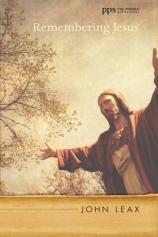Remembering Jesus: Sonnets and Songs
Review
Remembering Jesus: Sonnets and Songs
The one novel I’ve had published, MARY’S JOURNAL, was written in the voice of Mary, Jesus’ mother, as if she’d kept a diary --- from the Annunciation until the marriage of Cana, when Jesus “left home” and embarked on His ministry to the greater community. When the book released, a neighbor, somewhat aghast, asked, “Wherever did you find it?” “Whoa,” I answered. “Fiction. I made it up.” Someone else, a New Yorker, asked if the journals had been “channeled” by Mary. Again, no.
Someone might possibly ask the same questions of John Leax, who has written a keen collection of some 50 poems, each in the voice of a first-century character who had known, seen or been familiar with Jesus, his family, including John the Baptist, or his disciples.
"...a keen collection of some 50 poems, each in the voice of a first-century character who had known, seen or been familiar with Jesus, his family, including John the Baptist, or his disciples."
Most of these poems are sonnets. But don’t let either of those nouns, poems or sonnets, frighten you away. To enter into the reflective memories, you don’t need to know what a sonnet is or how it’s constructed. You don’t need to be someone who likes poetry.
Some poems require a bit of biblical knowledge. For example, the first, titled “Prayer,” is “written by” the apostle Peter, unnamed but recognizable by the phrase “my three denials.” Here he is sadly, hopefully, looking back on the tragic end of his “brother, Judas,” Jesus’ betrayer.
A few poems are “spoken by” imaginary or extra-biblical characters, such as that in “Bethzatha.” Someone (presumably a man, though sex isn’t stated) reflects bitterly on the day Jesus came to the Sheep Gate pool, healed a compatriot who stood and walked away, while our man ineffectually “called to the rabbi’s back.” But “He did not turn.”
Each poem cites a scriptural reference that hooks the Leax lines to their biblical context. This would be helpful for readers who choose to read the book devotionally, one poem at a time, maybe through Advent or Lent. (Christmas poems appear toward the beginning of the volume; Passiontide and Easter poems are spread throughout.) I read the collection in a few evenings, waiting in a few queues, with no Bible at hand. I was baffled only by one or two (the ending of “The Young Ruler,” which seems to refer to characters in another Gospel or story).
The stories reflect the pathos of the life characteristic of any time and place, but overall you see joy and redemption. I think of “The High Priest’s Maid” --- the young woman who prompted Peter’s denials. Her reflective sonnet ends with a rhymed declaration of faith, prompted now by Peter’s empowerment: “The Spirit lifted him at Pentecost; / His fiery word retrieved me from the lost.”
Reviewed by Evelyn Bence on August 13, 2014
Remembering Jesus: Sonnets and Songs
- Publication Date: March 20, 2014
- Genres: Christian, Christian Fiction, Fiction, Poetry
- Paperback: 60 pages
- Publisher: Cascade Books
- ISBN-10: 1625645600
- ISBN-13: 9781625645609



